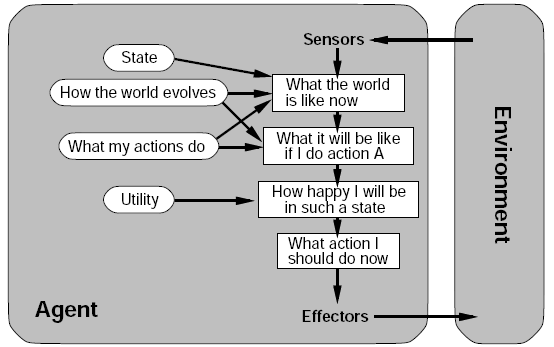This post is about a subject that has occupied my mind for many years. It is not a complete theory by a long shot, but this time is as good as any to express the main idea.
The subject is the needs-based agent, a term that I coined for a type of intelligent agent that acts on its own needs. It extends the ideas of "Artificial Intelligence - A Modern Approach" with those of Abraham Maslow.
Types of Agents
In "Artificial Intelligence - A Modern Approach", by Stuart Russell and Peter Norvig, a book I read for a university class on AI, several types of agents were introduced, in increasing order of complexity.
- Simple reflex agents: these agents have a set of condition-action rules that determine their next action
- Agents that keep track of the world: agents with an internal state, with memory if you will
- Goal based agents: agents that use search and planning to reach their goals
- Utility-based agents: agents that select the best action to reach a goal, if multiple actions are available
The utility-based agent (from "Artificial Intelligence - A Modern Approach")
Maslow on Human Needs
In "Motivation and Personality" Abraham Maslow unfolds his positive theory of the human psyche, in which the concept of needs has a central role. Maslow describes a hierarchy of basic human needs.
- Physiological needs: the need for food, oxygen, sleep, sex, ...
- Safety needs: the need to be in a safe place, both physically and phychologically
- The belongingness and love needs: the need to be loved, to give and receive affection
- The esteem needs: the need to be valued by others
- The self-actualization need: the need to express their individual nature
The basic needs (from Wikipedia)
As Maslow is a cognitive psychologist, he describes the human needs in a functional way. Almost ready to be modelled in a computer model.
A needs-based agent is then simply an agent that acts according to his needs.
The Difference Between Goals and Needs
You are entitled to ask yourself if a need is not simply another term for a goal. Indeed, a need has the aspect of something that is to be reached, just like a goal. Also, search and planning are needed to fulfill a need. But there's an important difference: needs are not goals in themselves; needs cause goals.Take the need for food for example: when you're hungry, eating becomes a goal. But when you're not hungry, there's no goal. In fact, when you've eaten too much, avoiding more food may become a goal in itself. ;)
To frame hunger in functional terms:
- Need: the need for sugar
- Resource: the amount of sugar present in the body
- Desired state: at least n grams of sugar
- Present state: too low
- Goal: a certain level of sugar in the body
Note also, that many needs are dormant. This is where the hierarchy comes in. Higher needs are only activated when lower needs are fulfilled. One only thinks of writing a blog post after he has eaten, is in a safe place, and is loved by others.
A New Agent Diagram
Since I picture this agent as an elaboration of the existing agent types, it lies within reason that I create an agent diagram for it, that extends the utility based agent. Here it is:
The needs-based agent (my own production)
The Sims
As I finish this article, I notice an article that I had not seen before. It is written by Robert Zubek on the information structure of the computer game The Sims.
The Sims, that my wife and children play a lot, is based on exactly this agent architecture. Quoting from the article:
Needs correspond to individual motivations: for example, the need to eat, drink, or rest. The choice of needs depends very much on the game. The Sims, being a simulator of everyday people, borrowed heavily from Maslow’s hierarchy (a theory of human behavior based on increasingly important psychological needs), and ended up with a mix of basic biological and emotional drivers.



No comments:
Post a Comment